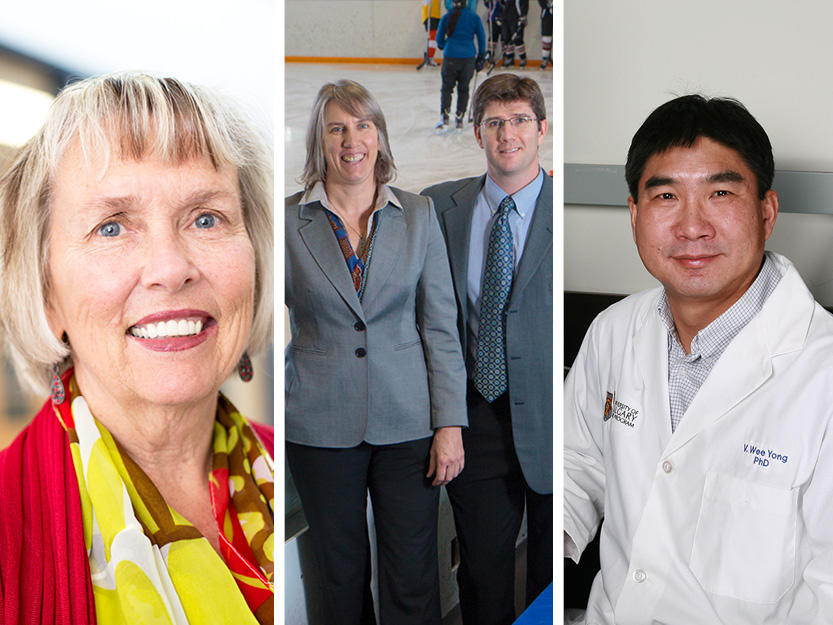Nov. 23, 2015
University's Peak Scholars bring discoveries from campus to community

President Elizabeth Cannon recognized the inspirational work of Peak Scholars from across campus.
Riley Brandt, University of Calgary
From mining historical pharmaceutical banks for compounds and protecting multiple sclerosis sufferers to getting young athletes back in the game after injuries, scholars engaged in the community at the University of Calgary are shaping how we live.
In recognition of the inspirational work taking place across campus, President Elizabeth Cannon hosted the Peak Scholars in Entrepreneurship, Innovation, and Knowledge Engagement recognition event on Nov. 18.
“The University of Calgary is dedicated to solving the world’s most pressing problems,” says Cannon. “Our scholars and students are making discoveries every day that are shaping the quality of life in our communities at home and abroad, and the annual Peak Scholars’ event celebrates their work.”
The Eyes High strategy is based on the fundamental principle that discovery belongs to everyone. Celebrating the many scholars, from across disciplines, who are engaging with the community is how the Advisory Committee on Entrepreneurship and Innovation (ACEI) and the Advisory Committee on Knowledge Engagement are recognizing their leadership and achievements.
“Our Peak Scholars in Entrepreneurship, Innovation, and Knowledge Engagement make up a community of researchers who take their work outside the lab and off campus, resulting in transformational changes in people’s lives. I am tremendously proud of the scholars we recognized today — they are doing truly inspirational work that has a major impact on communities around the world,” says Ed McCauley, vice-president (research).

The Peak Scholars in Entrepreneurship, Innovation, and Knowledge Engagement luncheon event.
Riley Brandt, University of Calgary
Kim Neutens, director of the Hunter Centre for Entrepreneurship and Innovation in the Haskayne School of Business and co-chair of the ACEI, underlines the importance of entrepreneurial training and support for scholars and students. “Engagement and collaboration among our academics, and also between academics and the community, is how we ensure seamless continuity between our campus and our community.”
Neutens’ co-chair of the ACEI, Frank Maurer, adds, “We are seeing a profound culture-change building on our campus and in our community. Gone are the days of the ivory tower; the University of Calgary is embedded in our community.”
Peak Scholars are nominated by their deans, in recognition of their excellence and achievements in entrepreneurship, innovation, and knowledge engagement, where their academic work has had an impact outside of the institution. This year’s Peak Scholars join the first cohort from last year — establishing a growing community of researchers who will serve as ambassadors to promote entrepreneurial thinking and knowledge engagement.
Here are just a few examples of the vital community-oriented research taking place at the University of Calgary.

From left, 2015 Peak Scholars Deb White, Carolyn Emery and Brent Hagel, and Dr. V. Wee Yong.
Improving the lives of those with multiple sclerosis from lab to clinical trials
With the strengths of bench-to-bedside research, Dr. Wee Yong in the Cumming School of Medicine is working with collaborators, Dr. Luanne Metz and Dr. Marcus Koch on a clinical trial for a promising reparative medication for multiple sclerosis (MS). An unpredictable and often disabling disease in which the immune system attacks the spinal cord and brain, MS causes severe neurological damage. Peak Scholar Yong is applying his pioneering knowledge of how immune cells enter the brain to protect patients against the injurious molecules that immune cells deliver.
Getting ahead of the game to prevent injury in youth sport and recreation
While 35 per cent of young Albertans between the ages of 11 and 17 will sustain a sport-related injury that requires medical attention this year, lack of knowledge will prevent injury prevention programs from changing the course of this trajectory. Carolyn Emery and Brent Hagel, Peak Scholars who are both from the Department of Pediatrics in the Cumming School of Medicine, are leading investigators in injury prevention in child and adolescent sport and recreation. They are working to raise awareness. By bringing together coaches, educators, youth and community partners in their research program — from the program planning stage through to dissemination of the evidence — the two are actively informing practice and policy to facilitate behaviour change.
Nursing researcher finding ways to help improve Alberta’s health-care system
Networks operate from a position of strength, and Debbie White from the Faculty of Nursing is helping to build the strength of Alberta’s Strategic Clinical Networks (SCN). These interdisciplinary networks are highly inclusive, including health professionals, researchers, policy-makers, decision-makers, patients and their families. SCNs are developing and implementing evidence-based innovations to improve outcomes for Albertans as well as system outcomes. White is looking at nine current SCNs including emergency, addictions and mental health, cancer, bone and joint, surgery, cardiovascular and stroke, diabetes, obesity and nutrition and critical care. White and her team have been instrumental in developing products to facilitate exchange of findings and evidence between the research team and SCN.
Find a full list of the 2015 Peak Scholars on the website.
The University of Calgary’s Hunter Centre for Entrepreneurship supported the Peak Scholars celebration as part of Global Entrepreneurship Week that ran from Nov. 16 to 22.
